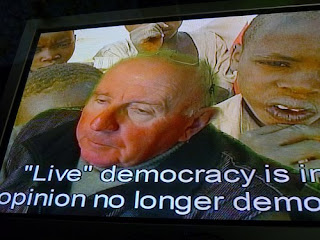There was a recent interview of the French Philosopher of Disaster, Paul Virilio, at Vice Magazine (hat tip Naked Capitalism).
The interview discusses his believe that the our reality is driven by the speed of technology, and technology advance, and that with this speed we invent the seeds of our own distruction.
I went hunting for some more information and found another interview2 that took place just after the Kosovo campaign and found some parts of it to be rather prophtic. He comments on both the logistics of media, and the elesivesness and speed of the individual activities of war (terrorists if they are on the other side).
Paul Virilio: Now, if we consider my latest book, Strategie de la deception, what we need to focus on are the other aspects of the same phenomenon. For the strategies of deception are concerned with deceiving an opponent through the logistics of perception. But these strategies are not merely aimed at the Serbs or the Iraqis but also at all those who might support Milosevic or Saddam Hussein. Moreover, such strategies are also aimed at deceiving the general public through radio, television and so on.
In this way, it seems to me that, since 1984, my book on the logistics of perception has been proved totally correct. For instance, almost every conflict since then has involved the logistics of perception, including the war in Lebanon, where Israel made use of cheap drones in order to track Yasser Arafat with the aim of killing him. If we look at the Gulf War, the same is also true. Indeed, my work on the logistics of perception and the Gulf War was so accurate that I was even asked to discuss it with high-ranking French military officers. They asked me: 'how is it that you wrote that book in 1984 and now it's happening for real?' My answer was: 'the problem is not mine but yours: you have not been doing your job properly!'
John Armitage: Let us turn to vision machines of a different variety. To what extent do you think that watching the Kosovo War on TV reduced us all to a state of Polar Inertia (1999 [1990]), to the status of Howard Hughes, the imprisoned and impotent state of what you call 'technological monks'?
Paul Virilio: There can be no doubt about this. It even held true for the soldiers involved in the Kosovo War. For the soldiers stayed mostly in their barracks! In this way, polar inertia has truly become a mass phenomenon. And not only for the TV audiences watching the war at home but also for the army that watches the battle from the barracks. Today, the army only occupies the territory once the war is over. Clearly, there is a kind of inertia here. Moreover, I would like to say that the sort of polar inertia we witnessed in the Kosovo War, the polar inertia involving 'automated war' and 'war-at-a-distance' is also terribly weak in the face of terrorism. For instance, in such situations, any individual who decides to place or throw a bomb can simply walk away. He or she has the freedom to move. This also applies to militant political groups and their actions. Look at the Intifadah in Jerusalem. One cannot understand that phenomenon, a phenomenon where people, often very young boys, are successfully harassing one of the best armies in the world, without appreciating their freedom to move!

No comments:
Post a Comment